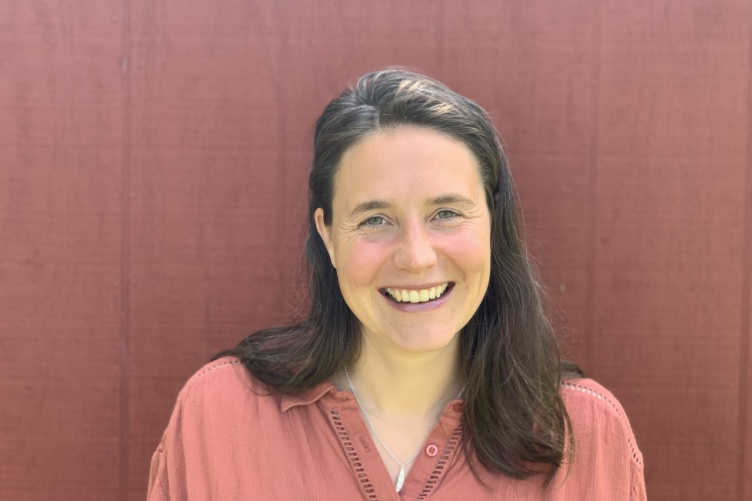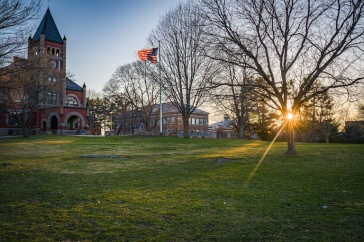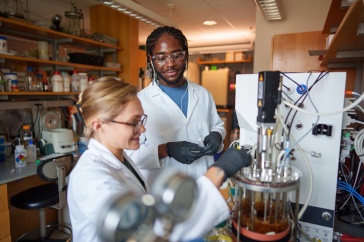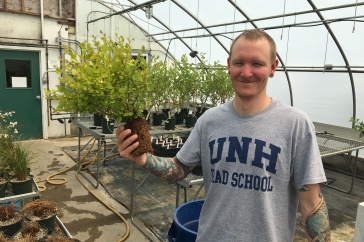
Natalie Lounsbury, a graduate student studying agroecology in UNH’s Natural Resources and Earth System Sciences Ph.D. program, has received a 2020 Switzer Fellowship.
The Switzer Fellowship Program offers one-year fellowships to highly talented graduate students in New England and California whose studies and career goals are directed toward environmental improvement and who demonstrate leadership in their fields. The award includes a $15,000 fellowship and connects fellows to a network of more than 650 Switzer Fellowship alumni, including recent UNH NRESS grad Olivia Fraser and current NRESS PhD Candidate Tamara Marcus, both of whom Lounsbury says were instrumental in preparing her for the interview process. The honor also includes leadership training, this year focused on equity in environmental work. Lounsbury says this training will help her more critically examine equity in agricultural issues, such as land access and extension agendas.
Supported by the New Hampshire Agricultural Experiment Station (NHAES), Lounsbury’s research explores farming practices that support both the farmer and the environment. Her focus is on using cover crops—crops grown for the protection and enrichment of the soil, but are not harvested for sale—in order to reduce tillage, and ultimately aid farms in nutrient cycling, water management, weed management, and soil health. By addressing practical limitations that farms face in implementing these systems, Lounsbury hopes to help make no-till vegetable methods more feasible and sustainable.
“Natalie’s work will contribute directly to addressing environmental problems associated with food production in both the short and longer terms, while at the same time empowering farmers themselves to be the solution,” says her advisor, associate professor of natural resources and the environment Richard Smith, with whom Lounsbury has been working at the NHAES Woodman Horticultural Research Farm. “I’m not at all surprised that she was selected to be a Switzer Fellow. Natalie is truly an emerging leader in sustainable agriculture.”

Lounsbury got her start in the early 2000’s as an apprentice at a small organic vegetable farm, of which she eventually became the farm manager.
“Seeing erosion had a powerful effect on me,” Lounsbury says. “I remember one time I tilled in a field of tomatoes in fall and then we got a big rainstorm. There were little gullies visible in the field, even though it only had a very gentle slope. It's pretty basic, but the first step in maintaining or building soil health is to keep soil in place.”
Lounsbury’s first-hand experience farming motivated her research on reducing tillage and growing cover crops, which she has now been pursuing for nearly a decade.
“Weeds are the biggest management challenge for implementing no-till production,” Lounsbury says. Her research ultimately addresses this issue for farmers who choose not to use herbicides, advocating instead for growing cover crops to compete with the weeds. Because cover crops are not 100% effective on their own, Lounsbury encourages the use of reusable tarps in conjunction with cover cropping. Not only are these practices a “win-win for both the farmer and the environment,” but they are also critical as farmers face the extremes of climate change.
“Agriculture is one of the most detrimental things that we humans do, and yet we have to keep doing it,” Lounsbury says. “I see my current research as making small but important improvements to how we practice agriculture, but in the future, I also want to ask questions and research ways we can make more drastic changes to agriculture to reduce its impact.”
Read more about Lounsbury's research with NHAES on no till farming here.
-
Written By:
Lily Greenberg '21G | Grad School

















































